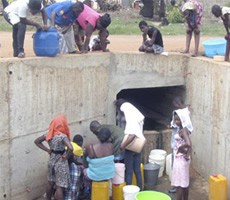Even though the Krobo area is known for the location of two water supply plants – Kpong and Bukunor Water Treatment Plants – water is a scarce commodity, even in Odumase, Somanya and Asesewa, the municipal and district capitals of Lower Manya, Yilo Krobo and Upper Manya respectively.
Residents in these three communities hardly see water flowing through their taps, sometimes for over four months, whilst some parts of Accra, Koforidua, Nsawam and other areas enjoy water supply from the Kpong and Bukunor water treatment plants.
The World Health Organizsation (WHO) estimates that about 1.1 billion people rely on unsafe drinking water sources in developing countries, and that the lowest drinking water coverage rates are in Sub-Saharan Africa (58 percent). Water-related health problems, according to WHO, kill more than 5 million people annually, with infants being the most affected.
In most cases, majority of the people living in the rural areas depend on sources which are contaminated, and also susceptible to water-borne diseases. In drumming home the adage that the silence of the people is a warning to the King, the chiefs and people of Bukrum, a farming community in the Yilo-Krobo Municipality, have angrily expressed their dissatisfaction over the government’s inability to provide at least a common borehole for the area.
Residents of the farming community, who have lived near two muddy streams which have served as their sources of drinking water over the few years, have stated that they are not animals to undergo such inhuman treatment.
Speaking on behalf of other six colleague chiefs during a mini durbar organised by the people to welcome the leadership of Kloma Hengme, a leading pressure group in the municipality, the Chief (“Dadematse”) of Blukum–Maumi, Dadematse Kofi Osanyogmor, averred that the two sources of water are very unhygienic, unsafe, contaminated, and contributing to a number of water-borne diseases in the village.
Dadematse Kofi Osanyogmor continued that apart from the fact that the water sources are always muddy and contaminated, the situation becomes worse in the dry season, when the two streams that provide water to the community dry up. This came to light when Kloma Hengme visited the village as part of its rural support project, and in the company of the chiefs and other opinion leaders, inspected their two sources of drinking water.
He also lamented that incessant appeals made to the government to provide them with safe drinking water have fallen on deaf ears. “As you can see for yourselves, our two streams that supply us with water are too muddy and unsafe for drinking. Anytime we drink from them, we get stomach problems and fever, not forgetting the numerous eye problems we are having here,” he lamented.
The Chief further stated: “We always try to de-silt them so we can always get water for our domestic chores. These two streams, because they are unable to flow easily, have remained stagnant, and are always contaminated, and are unhygienic.
“In the dry seasons, they both dry up and we have to climb up the mountains to search for water. We have been making several appeals to government to supply us with, at least, a well, but our appeals are not getting any attention from any one.”
Mr. Francis Nakotey, Director of Operations of Kloma Hengme, the two streams, added his voice to the call for the provision safe drinking water, described the two sources of drinking water as an “eye-sore” and “de-humanising.”
“Frankly speaking, I felt so bad after seeing the kind of muddy water the people of Bukrum and its environs consume. Their two sources of drinking water are too dehumanising and shameful. This is an eye-sore, and something urgently needs to be done to save our people,” he lamented.
The Operations Director of the Association, has, however, called for strong political will, partnerships, and resources to manage water to help reduce water-borne diseases with their attendant consequences on the socio-economic development in the area. He has, therefore, joined the community to remind the government and appealed to NGOs, agencies and philanthropists to come to the aid of Bukrum, to provide them with safe drinking water.
Regional News of Wednesday, 28 October 2015
Source: The Chronicle
We are not animals to drink muddy water – Bukrum residents
 File photo
File photo
















